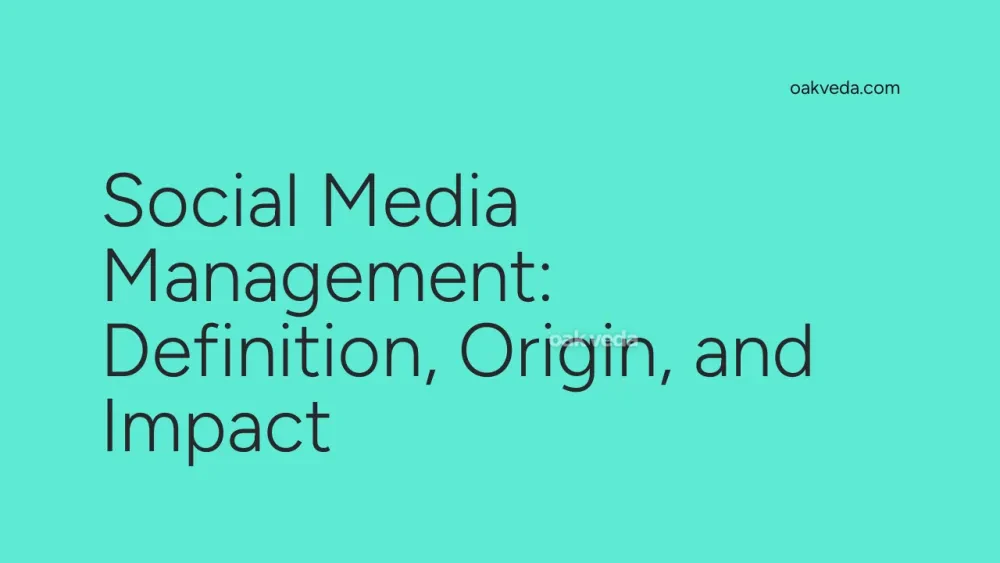
What is Social Media Management?
Social media management is the comprehensive process of creating, scheduling, analyzing, and engaging with content posted on social media platforms. It encompasses a wide range of activities aimed at building and maintaining an effective online presence for businesses, brands, or individuals. This strategic approach involves not just posting updates, but also interacting with followers, monitoring trends, and measuring the performance of social media efforts.
Origin and Development of Social Media Management
The concept of social media management emerged alongside the rise of social networking sites in the early 2000s. As platforms like MySpace, Facebook, and Twitter gained popularity, businesses recognized the need for dedicated strategies to leverage these new channels. The field has evolved rapidly, with the introduction of specialized tools and software to streamline processes and provide deeper insights into social media performance.
How Social Media Management Works
Effective social media management typically involves several key components:
- Content Creation: Developing engaging, relevant content tailored to each platform's unique audience and format.
- Scheduling: Planning and timing posts for optimal engagement using tools like content calendars.
- Community Management: Responding to comments, messages, and mentions to build relationships with followers.
- Analytics and Reporting: Tracking metrics such as reach, engagement, and conversions to measure success and inform strategy.
- Strategy Development: Aligning social media efforts with overall business goals and adapting to platform changes and trends.
Types of Social Media Management
Social media management can be categorized based on the approach or focus:
- In-house Management: Businesses handle their social media presence internally with dedicated staff.
- Agency Management: External agencies are hired to manage social media accounts on behalf of clients.
- Influencer Management: Focusing on managing relationships with influencers for brand collaborations.
- Crisis Management: Specialized approach for handling reputation issues and negative publicity on social platforms.
Popular Examples of Social Media Management
Several brands have excelled in social media management, setting benchmarks for the industry:
- Wendy's: Known for its witty and sometimes snarky Twitter presence, engaging followers with humor and personality.
- Nike: Consistently delivers inspiring content across platforms, leveraging user-generated content and athlete partnerships.
- Glossier: Builds a strong community through authentic engagement and user-generated content on Instagram.
Impact of Social Media Management on Social Media Culture
Social media management has significantly influenced online culture:
- Content Quality: Raised standards for content creation, encouraging more polished and strategic posts.
- Brand Personality: Allowed brands to develop unique voices and personas, humanizing their online presence.
- Real-time Marketing: Enabled quick responses to current events and trends, creating more timely and relevant content.
- Customer Service: Transformed customer support by providing immediate, public channels for issue resolution.
Controversies Surrounding Social Media Management
While powerful, social media management is not without its challenges:
- Authenticity Concerns: Some users feel that heavily managed accounts lack genuine interaction.
- Privacy Issues: The collection and use of user data for targeted marketing raise privacy concerns.
- Algorithmic Changes: Frequent updates to platform algorithms can disrupt established management strategies.
- Misinformation Spread: The rapid nature of social media can sometimes lead to the unintentional spread of false information.
How Brands and Influencers Use Social Media Management
Brands and influencers leverage social media management to:
- Build and maintain a consistent brand image across platforms
- Increase engagement and grow their follower base
- Drive traffic to websites or online stores
- Collaborate on campaigns and sponsored content
- Gather insights about their audience preferences and behaviors
- Provide customer support and address concerns publicly
Future Trends in Social Media Management
The field of social media management continues to evolve:
- AI and Automation: Increased use of artificial intelligence for content creation, scheduling, and customer service.
- Video Dominance: Growing emphasis on short-form video content across platforms.
- Social Commerce: Integration of e-commerce features directly into social media platforms.
- Augmented Reality: Incorporation of AR filters and experiences in social media campaigns.
- Data Privacy Focus: Greater emphasis on ethical data use and transparency in social media strategies.
FAQs about Social Media Management
-
What skills are needed for social media management? Key skills include content creation, analytics interpretation, customer service, strategic planning, and adaptability to new trends and technologies.
-
How often should businesses post on social media? Posting frequency varies by platform and audience, but consistency is key. Generally, 1-2 times daily on platforms like Facebook and Instagram, and 3-5 times daily on Twitter is considered effective.
-
Can social media management be automated? While aspects like scheduling can be automated, effective management requires human touch for engagement, creativity, and strategic decision-making.
-
How do you measure the success of social media management? Success metrics include engagement rates, follower growth, website traffic from social channels, conversion rates, and return on investment (ROI) for paid campaigns.
-
Is social media management necessary for small businesses? Yes, even small businesses can benefit from social media management to build brand awareness, engage with customers, and drive growth cost-effectively.
In conclusion, social media management has become an indispensable part of digital marketing strategies. As social platforms continue to evolve and user behaviors shift, the field of social media management will remain dynamic, requiring constant learning and adaptation. Businesses and individuals who master these skills will be well-positioned to thrive in the ever-changing digital landscape.
You may be interested in:
- Pinned: Definition, Origin, and Impact on Social Media
- Content Curation: Definition, Origin, and Impact
- ICYMI: Definition, Origin, and Impact on Social Media
- BeReal: Definition, Origin, and Impact on Social Media
- Evergreen Content: Definition, Origin, and Impact
- Brand Partnership: Definition, Origin, and Impact

